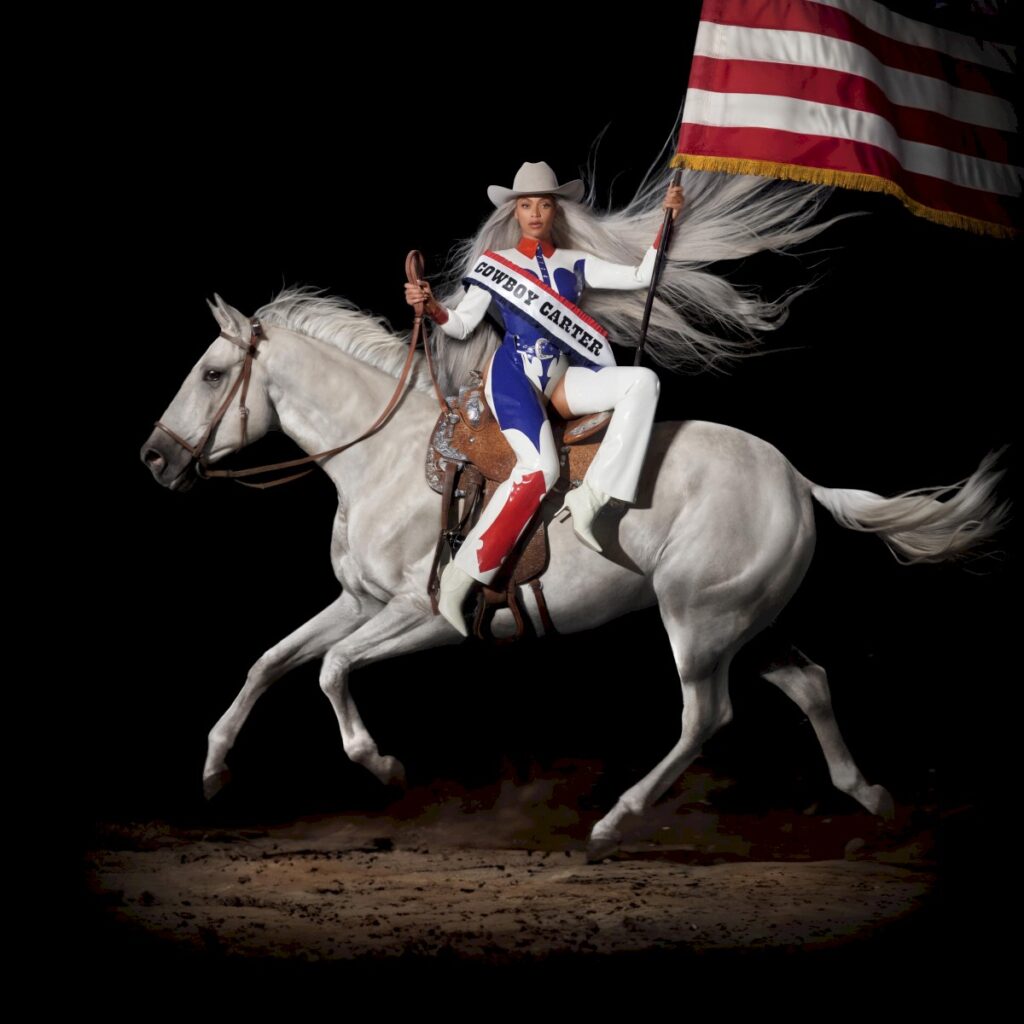Beyoncé, ‘Cowboy Carter,’ March 29, 2024

Help me, Lord, from these fantasies in my head
They ain’t ever been safe ones
I don’t fellowship with these fake ones
So let’s travel to white chapels and sing hymns
Hold rosaries and sing in stained-glass symphonies
Cleanse me, Holy Trinity, from this marijuana smoke smell in my hair
Dedicated as Act II in what promises to be an emblematic trilogy that commenced with 2022’s Renaissance, Beyoncé’s latest album Cowboy Carter is an intricate narrative that weaves through the annals of Americana, while simultaneously rendering a modernist perspective on cultural identity and genre fluidity. To label Cowboy Carter merely as a country album would be a reductive oversimplification. It’s a profound reinvention of Americana through an ambitious amalgamation of country, blues, funk, folk, R&B, and beyond, all while peppered with dollops of her characteristic glamor and theatrics.
The album’s title itself, derived from the derogatory usage of “cowboy” to label Black men handling horses and cattle post-emancipation, is a stark reclamation. As Beyoncé herself elucidates, it’s about dismantling that negative connotation and celebrating the strength and resiliency that epitomized these men. The album offers a complex perspective on American identity. By using the Western trope, Beyoncé interrogates the oft-celebrated, yet equally marginalized contributions of Black Americans to the cultural fabric of the U.S. This examination begins strikingly with Ameriican Requiem, where the artist deploys her powerful vocals to question the hypocrisy of a nation that was built on the backs of enslaved people. Her thematic discourse stretches across issues of racial injustice, identity, and the intertwining histories of Black and white America. Tracks like Texas Hold ’Em and 16 Carriages ground the album in a Southern aesthetic while exploring broader narratives about the Black experience in the heartland of country music. Beyoncé’s lyrical dexterity propels Cowboy Carter into a league of its own. The way she melds personal stories with broader cultural narratives is nothing short of masterful. Daughter, a traditional murder ballad with operatic undertones, explores fantasies of revenge while remaining grounded in personal angst. Not to be overlooked is her audacious cover of Dolly Parton’s Jolene, where Beyoncé transforms the traditionally plaintive cry into a powerful statement of strength. Her adroit adaption repurposes the familiar narrative, ascribing herself the title of a “Creole banjee bitch from Louisiane,” thus intertwining her cultural roots with broader Western themes.
The album’s intricate production, executed with meticulous precision, furthers Beyoncé’s vision of blending genres. The artist herself, alongside illustrious producers such as Derek Dixie, Jon Batiste, and No I.D., has orchestrated an auditory tapestry that traverses from the haunting resonance of blues to the intricate syncopations of funk and folk. This fusion is most palpable in tracks like Ya Ya, where the electrified live band mirrors a parade of genre influences as Beyoncé navigates through lyrical and rhythmic complexities with enviable ease. Cowboy Carter is replete with audacity, confronting and reconfiguring the essence of American music and identity. Beyoncé’s vocal prowess serves as the centerpiece, wrapping experimental compositions and genre-blending arrangements around a core of unflinching lyrical honesty and cultural critique. Through its diverse influences, rich in both historical and modern contexts, Cowboy Carter asserts Beyoncé’s mastery over any genre she deems fit for her singular brand of artistry. This album is not merely a collection of songs but a reckoning with American musical history. So far, Cowboy Carter is unequivocally my album of the year 2024.
Two hands to Heaven
I’ve prayed, priest forgive my soul
Lovely daggers pierced my heart many moons ago
Toxic roses chased by wolves and carnivores
Lost virgins with broken wings that will regrow
Vampire Weekend, ‘Only God Was Above Us,’ April 5, 2024

Fake fortune teller scandalized by fate
Broke bodybuilder crushed beneath the weight
Lost and deluded trying to find your place
Inept long-distance runner losing every race
Vampire Weekend’s fifth studio album, Only God Was Above Us, marks a significant evolution in the band’s discography, which is the first album recorded by the band as a trio, following the departure of keyboardist Rostam Batmanglij in 2016. The album’s title, Only God Was Above Us, is derived from a quote by a passenger on Aloha Airlines Flight 243, which experienced a catastrophic incident in 1988 when its roof came off mid-flight. This title sets the tone for an album that delves into themes of fatalism, disillusionment, and ultimately, hope and progress. The record is not overtly political but serves as a musical commentary on the status quo, including international conflicts, generational attitudes, and society’s unrelenting grip on historical traumas. This existential thread runs through the album, as Ezra Koenig navigates the concept of hope, societal decay, and personal reflection with a cerebral yet accessible touch. Koenig’s penchant for offbeat storytelling and literate lyrics remains intact, yet the songwriting on Only God Was Above Us feels both more intimate and more expansive. The lyrics often delve into personal and collective experiences, offering a narrative that is at once introspective and outward-looking. For example, Ice Cream Piano starts with a simple guitar and harmonies before escalating into a fast-paced explosion of punk distortion, with lyrics that speak to generational angst and historical reflection: “I see the vampires walkin’ / Don’t be gripped by fear, you aren’t next / We’re all the sons and daughters of vampires who drained the old world’s necks.” Capricorn emerges as perhaps one of the band’s greatest songs to date, a subdued demi-ballad that offers Koenig’s weary advice, “You don’t have to try,” atop a bed of intricate melodies and refined production.
Only God Was Above Us is a kaleidoscopic indie rock, blend of art, experimental, and baroque pop. The album’s sonic landscape is both familiar and novel, rooted in Vampire Weekend’s characteristic world of reverb and socially conscious indie pop but also adventurous in its exploration of new textures. The production work by Ariel Rechtshaid adds a polished yet adventurous finish to the record. The album’s sound leans into reverb-heavy atmospheres, lending a sense of dreamlike haze while maintaining clarity in composition. The result is a cohesive, well-constructed album without any glaring weak spots, a notable departure from some of their earlier albums’ less consistent spots. Far from being a nostalgic endeavor, the album captures the essence of a band still willing to innovate, challenge, and ultimately, captivate. In a world rife with noise and chaos, Only God Was Above Us finds beauty in the messiness of existence and stands as a testament to Vampire Weekend’s enduring relevance and artistic versatility.
Ariana Grande, ‘eternal sunshine,’ March 8, 2024

Saturn comes along and hits you over the head
Hits you over the head, hits you over the head, and says, “Wake up”
Aha, it’s time for you to get real about life
And sort out who you really are
Ariana Grande has consistently released albums that not only conform to the pop/R&B paradigms but also serve as significant bookmarks in her prolific career. Eternal Sunshine, her seventh studio album, epitomizes this approach by weaving threads of Grande’s personal life with universal themes of love, heartbreak, and self-rediscovery. This nuanced endeavor arrives after a four-year hiatus, yet Grande delivers an intimate and sonically cohesive project that resonates deeply. eternal sunshine is a conceptual project designed to reflect the emotional labyrinth Grande navigated during a period of personal upheaval. Inspired by Michel Gondry’s film Eternal Sunshine of the Spotless Mind, the album leverages the film’s narrative of memory erasure to explore the complexities of relationships and self-identity. Grande’s ability to dissect and articulate her emotional state is apparent in songs like eternal sunshine, where she sings about wanting to “wipe [her] mind” to cope with the remnants of a broken relationship. The album offers a candid exploration of love’s impact, the deception of self-perception, and an ultimate desire for closure. In contrast to the bombastic soundscapes of her previous albums such as Positions, eternal sunshine is marked by its restraint. Songs like bye and the eponymous eternal sunshine adopt a more introspective tone, showcasing Grande’s ability to convey subtle emotional shifts through her vocal delivery. The album’s production streams between melancholic ballads and upbeat anthems, ensuring that emotional depth is matched with sonic variety. For instance, we can’t be friends (wait for your love) stands out as a Robyn-inspired Europop track that’s perfectly suited for both cathartic crying sessions and liberating dance breaks. Thematically robust and emotionally charged, the album offers a blend of vulnerability and strength that feels both raw and refined. The restrained yet layered production underscores the intimate lyrical content, allowing Grande’s message to resonate. From my POV, eternal sunshine is the best album of Grande’s career.